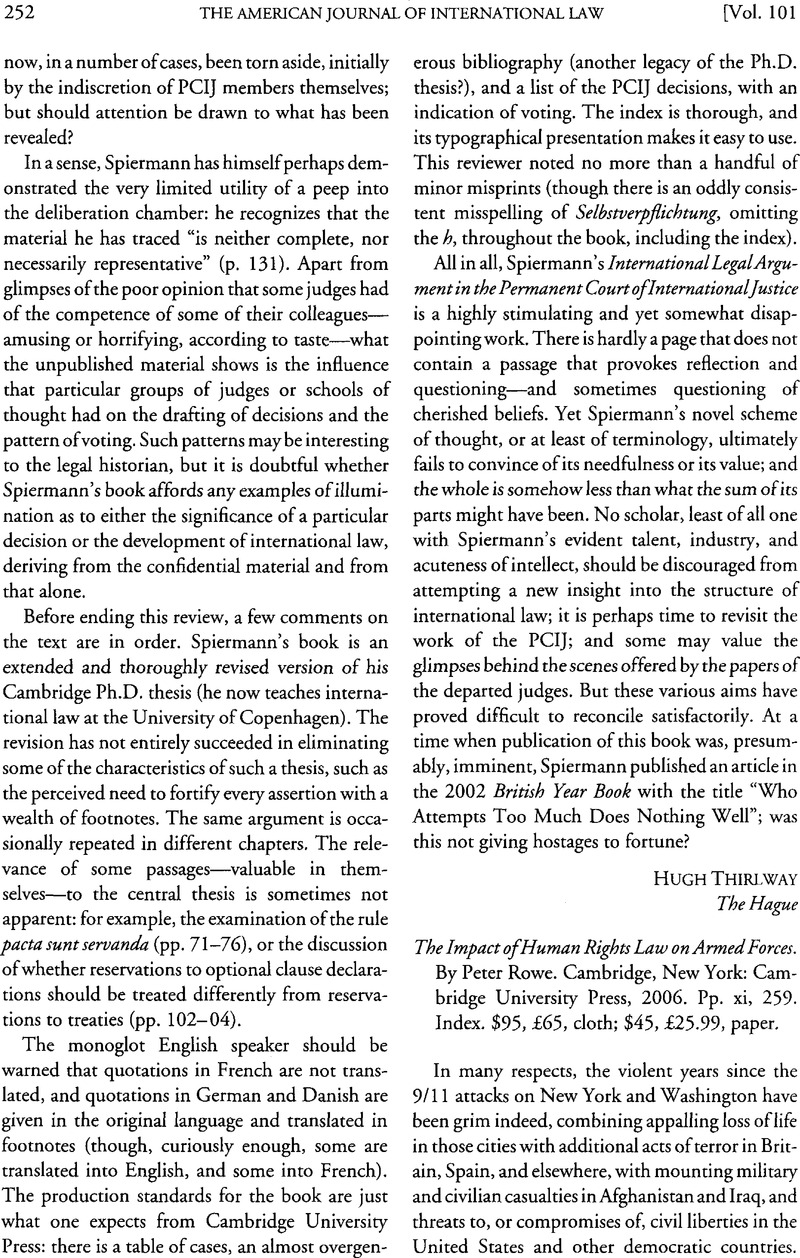No CrossRef data available.
Article contents
The Impact of Human Rights Law on Armed Forces. By Peter Rowe. Cambridge, New York: Cambridge University Press, 2006. Pp. xi, 259. Index. $95, £65, cloth; $45, £25.99, paper.
Published online by Cambridge University Press: 27 February 2017
Abstract

- Type
- Recent Books on International Law
- Information
- Copyright
- Copyright © American Society of International Law 2007
References
1 Examples include European Military Law Systems (Georg Nolte ed., 2003) and Federico Andreu–Guzman, Military Jurisdiction and International Law (2004).
2 Armed Forces Act, 2006, c.52.
3 E.g., Hamdan v. Rumsfeld, 126 S.Ct. 2749 (2006) (invalidating presidentially created military commissions).
4 E.g., UN Comm’n on Human Rights, [Report Submitted by the Special Rapporteur of the Sub–Commission on the Promotion and Protection of Human Rights, Emmanuel Decaux], UN Doc. E/CN.4/ 2006/58 (Jan. 13, 2006) (Draft Principles Governing the Administration of Justice Through Military Tribunals).
5 [1997] UKHL 56, [1998] AC. 917.
6 30 Eur. Ct. H.R. 263(1997).
7 Martin v. United Kingdom, App. No. 40426/98, para. 45 (Eur. Ct. H.R. Oct. 24, 2006).
8 213 UNTS 222.
9 Martin v. United Kingdom, para. 44. But see UN Doc. E/CN.4/2006/58, supra note 4 (Principle No. 5 (“Military courts should, in principle, have no jurisdiction to try civilians. In all circumstances, the State shall ensure that civilians accused of a criminal offence of any nature are tried by civilian courts.”) & ¶ 21 (“[m]any thematic or country rapporteurs have also taken a very strong position in favour of military tribunals’ lack of authority to try civilians,” citing 2 Andreu–Guzmán, supra note 1)).
10 Martin v. United Kingdom, para. 45.
11 [1998] A.C. at 931 (Lord Hope of Craighead, citing Army Act, 1955, §133, as substituted by Armed Forces Act, 1966, §25(1)).
12 Martin v. United Kingdom, paras. 15, 38, 49.
13 Pub. L. No. 109–366, 120 Stat. 2600.
14 Oddly, the official who was designated as the “appointing authority” for the prestatutory military commissions—the equivalent of a “convening authority,” a post filled by a military commander—was a retired major general, but he was employed for this purpose as a civil servant rather than as a recalled retired regular officer. Thus, under that now superseded system, the civilian was made to look military, and the military was made to look civilian.
15 E.g., Reid v. Covert, 354 U.S. 1 (1957).
16 18 U.S.C. §§3261–3267.
17 John Warner National Defense Authorization Act for Fiscal Year 2007, §552, 120 Stat. 2083, 2217(2006) (amending UCMJ Art. 2(a)(10), 10 U.S.C. §802(a)(10)).
18 Peter, Rowe, Maintaining Discipline in United Nations Peace Support Operations: The Legal Quagmire for Military Contingents, 5 J. Conflict & Sec. L. 45 (2000)Google Scholar.
19 See generally Secretary–General, Comprehensive Report Prepared Pursuant to General Assembly Resolution 59/296 on Sexual Exploitation and Sexual Abuse, Including Policy Development, Implementation and Full Justification of Proposed Capacity on Personnel Conduct Issues, UN Doc. A/60/862 (May 24, 2006).
20 Id.
21 Dept. of Defense News Transcript, News Briefing with Secretary of Defense Donald Rumsfeld and Gen. Peter Pace, Nov. 29, 2005, at <http://www.defenselink.mil/transcripts/2005/tr20051129–secdef4361.html>; see also Dana, Milbank, Rumsfeld’s War on Insurgents,’ Wash. Post, Nov. 30, 2005, at A18 Google Scholar. Not surprisingly, the public disagreement became an object of media interest:
[CHRIS] WALLACE [HOST]: How was that, having to correct the boss in public?
PACE: Well, he and I were looking at it from two different prisms. First, I was looking at it from the question that I was asked, which was in Iraq, if detainees are being abused, what is your responsibility.
And we have very clearly in writing stated—22 July of this year, as a matter of fact, General Casey put an order out in writing that said everyone had an absolute responsibility to try to stop it.
The secretary, in subsequent conversations with him, was looking at it from a much larger position, the global position, and thinking about troops in other countries. So his position was if you are walking the streets of Tokyo, what would you do. Mine was very specific to the question I was asked. The secretary clearly expects me to speak the truth as I know it, and he always wants me to make sure that when he and I are in front of cameras and speaking in public, that when we walk away that we have been very precise and direct about what it was.
So the fact that he asked me the question and I answered him in public is exactly what he would expect me to do.
Fox News Sunday Interview, Gen. Peter Pace (Fox television broadcast Dec. 25, 2005), at <http://www.foxnews.com/story/0,2933,179718,00.html>.
22 See, e.g., United States v. Simmons, 63 M.J. 89, 92 (C.A.A.F. 2006) (noting 230 years of U.S. Navy and Marine Corps history, and accepting noncommissioned officer’s concession that he had duty to interfere).
23 See, e.g., United States v. Rockwood, 52 M.J. 98, 107–14 (C.A.A.F. 1999) (in case concerning junior officer’s self–appointed mission to inspect and rectify conditions at Haitian National Penitentiary (“There may be unusual situations in which an assigned military duty is so mundane, and the threat of death or grievous bodily harm to civilians is so clearly defined and immediate, that consideration might be given to a duress or necessity defense.”), held: question is moot due to form of jury instruction incorporating concept of necessity; conviction affirmed).
24 10U.S.C..§892(3).
25 10 U.S.C. §933.
26 These cases are by no means limited to the U.S. armed forces. Highly contentious courts–martial have also arisen in connection with British, Danish, and Dutch operations in Iraq. See generally Eugene R., Fidell, Accountability, Transparency and Public Confidence in the Administration of Military Justice, 9 Green Bag 2d 360 (2006)Google Scholar.
27 “Reader, if you seek his monument, look around you.”




